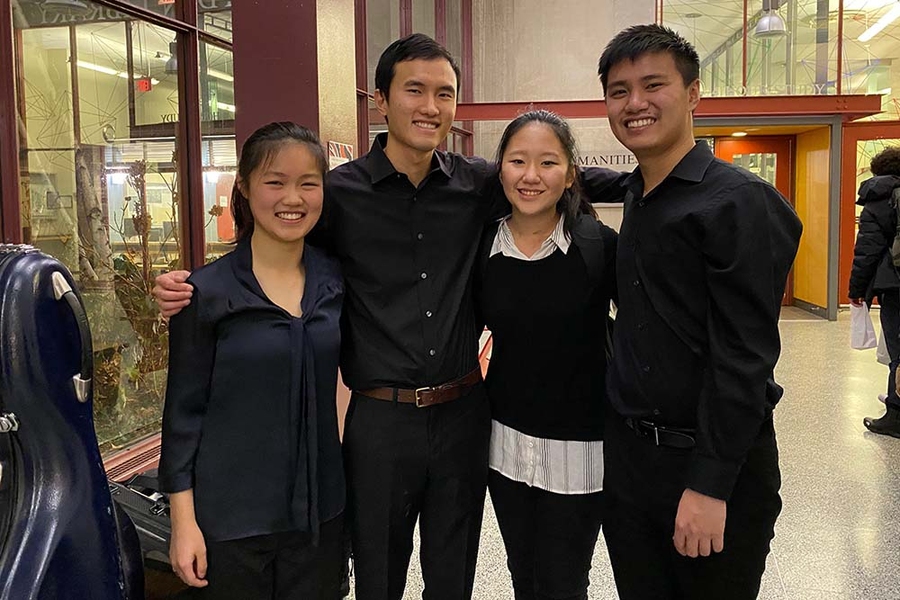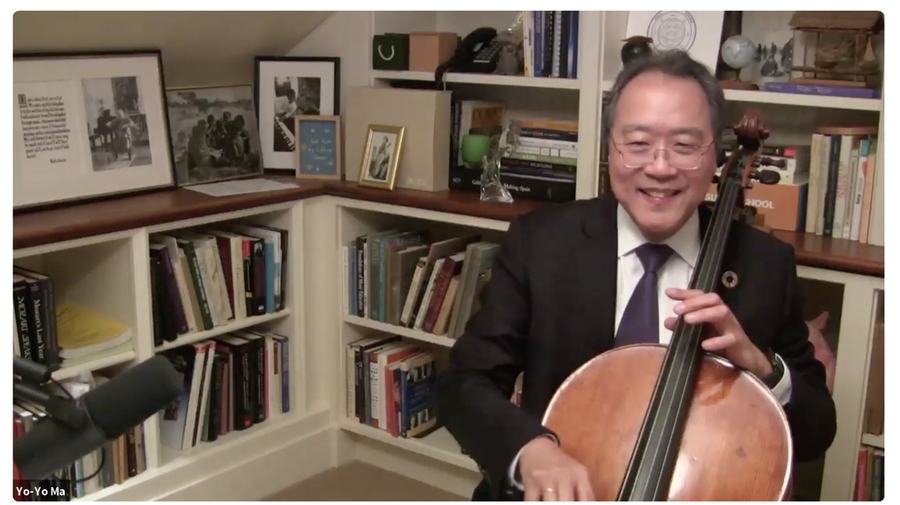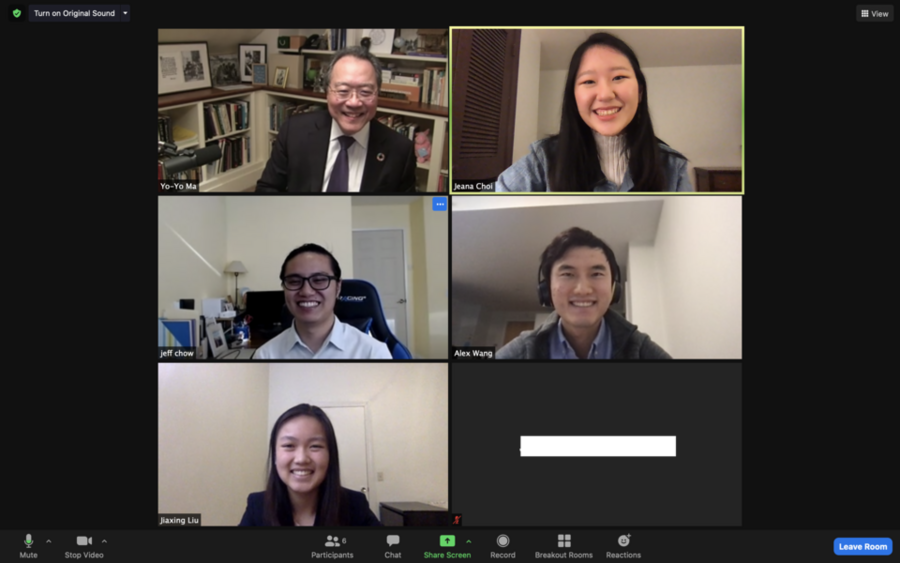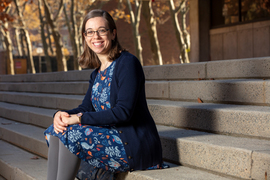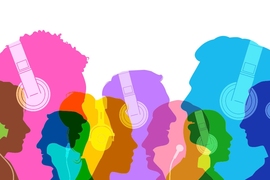Just a few months shy of February graduation during the pandemic and the start of a fifth-year master’s program, senior Jeana Choi realized that she had never taught a class during the January Independent Activities Period (IAP). “I thought, wow, I can’t end my college experience like this,” she says. An electrical engineering and computer science major who minored in music, Choi, a violinist, became excited by the prospect of teaching about something she loved: classical music.
The result of this moment of inspiration? “Classical Music in the Social Media Generation,” an IAP class featuring renowned performers Yo-Yo Ma, Hilary Hahn, Drew Forde, and Nahre Sol. Notable for their use of digital platforms to communicate directly with fans, they all make their music accessible to casual listeners and build new audiences. “They are literally world experts on the topic of connecting with people virtually,” says Choi.
She quickly identified collaborators for this venture: members of her string quartet, a group that had worked together nearly three years within MIT’s Chamber Music Society: violinist and computer science graduate student Jeff Chow ’20; violist Jiaxing Liu, a fourth-year majoring in biology and minoring in music and brain and cognitive sciences; and cellist and biological engineering postdoc Alex Wang PhD ’20.
“Instead of taking an IAP class, I thought it would be cool to be on the other side,” says Liu. “And this also seemed like a great way to give back to the entire MIT community.”
It had been difficult for the group during the previous spring, when the pandemic drove them off campus, and in the fall, when they were forced to play outside in MIT courtyards. Some members of the quartet would soon be completing their studies and departing MIT. “We wanted to end on a better note, and teaching this IAP class felt like a way to show appreciation to the arts departments of MIT, and to each other,” says Wang.
In a fitting finale to their years at MIT, they designed “Classical Music in the Social Media Generation” around their shared musical passion and tailored to a youthful age cohort in the time of pandemic. Drawing 100 MIT students, alumni and faculty, the class proved a hit.
Music idols
Recruiting their distinguished guest lecturers took several frantic months. Members of the quartet were avid followers of these musicians on their varied digital platforms and understood what unique contributions they could make to the course. Sidelined from touring by the pandemic and more engaged than ever in reaching out remotely, the performers each agreed to anchor a one-hour class combining presentation and Q&A.
These classes offered a unique opportunity for MIT organizers, along with the IAP class members, to meet their musical idols. At the same time, the sessions revealed how professional musicians navigate a world where classical music is, as Choi says, “not as popular with the younger generation as it used to be.” Their guest lecturers demonstrated how they are reaching across this generational divide, “creating content that isn’t just playing, but engaging audiences through humor or interesting topics,” says Wang.
Nahre Sol’s YouTube channel, for instance, features videos of what she calls “music as digested by a classical musician,” a series that includes low-fi hip-hop and pop. Through performances of familiar classics like “Happy Birthday” in the style of classical composers, which has drawn more than a million views in the past year, Sol has attracted more than 400,000 channel subscribers.
Drew Alexander Forde, known online as ThatViolaKid, approaches digital platforms from the perspective of an entrepreneur building a brand, with podcasts that touch on his interests outside of classical music. “He talked about being unique, having his own story, and how experiences shape who you are and what you want, which applies to anyone, in any career,” says Liu, who is thinking about his tips as she applies to medical school.
Hilary Hahn posts “Hahn Solos” as part of her blog, and aims to have “fun with creativity,” she told her IAP class. She incorporates visual and literary touches in her posts, and described her determination to remain upbeat with her fans and fellow musicians in spite of the pandemic.
Above all, these musicians offered a sense of hope in hard times, a way of using music to bind together both an immediate and larger, virtual community. As the virus began its destructive course early last year, Yo-Yo Ma sought a way to help Covid-19 victims and essential workers. “I started Zooming into hospital rooms and to patients … and thanking people,” he said. But, he suggested, everyone can “make the effort … and connect to what you have not been connected to.” Ma concluded his class with a performance of one of his “Songs of Comfort,” a series of self-recorded videos he shared in the early days of the pandemic lockdown.
Bittersweet finale
The remarks by Ma and the other performers resonated powerfully for the IAP organizers. With their time together at MIT rapidly approaching an end, they were reflective about the bonds music can forge.
The quartet, says Liu, had been an oasis from big lecture halls, “the first class where I really got to know my classmates.” For Wang, chamber music wasn’t just about performing but making “important life connections,” he says. The quartet “evolved into something more,” a group that listened so intently to each other during practice that it became “almost a finishing-each-other’s-sentences kind of thing,” he says. Adds Chow, “We’re each other’s chamber music buddies ... I don’t have the same relationship with any other friends.”
The intimacy of their relationship, says Choi, the result of watching and listening to each other carefully and respectfully, not only made the IAP class possible, but provided an unforgettable valedictory moment. “Though we might feel super alone in this pandemic, a community of 100 people came together, even virtually, which was comforting to see.”
This class was supported by MIT Music and Theater Arts and the Arts at MIT, with funding from The Council for the Arts at MIT, a group of alumni and friends with a strong commitment to the arts and serving the MIT community.
